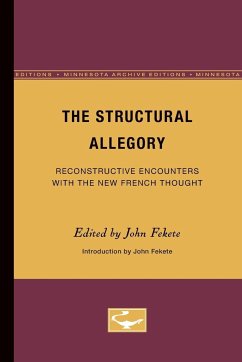The Structural Allegory was first published in 1984. Minnesota Archive Editions uses digital technology to make long-unavailable books once again accessible, and are published unaltered from the original University of Minnesota Press editions. The radical questions raised by Saussure, Barthes, Foucault, Levi-Strauss, and others have had an enormous impact on Anglo-American literary and cultural studies over the past twenty years. John Fekete argues that we can see this strategic development of French thought in terms of what he calls "the structural allegory." Structuralism proper has given way to the currently dominant model of post-structuralism, yet we remain uncertain of the practical orientations favored by thinkers associated with both phases of the movement. With the aim of uncovering the legacy of the structural tradition, the essays in this volume survey key French thinkers, including some not well known in the Anglo-American context — Baudrillard and Castoriadis. The essays are reconstructive, not deconstructive, in character, scholarly in method, and ecumenical in spirit. While the structural allegory emerges from this critical analysis as an inescapable intellectual paradigm (analogous to the transformations in quantum physics and modern biology), the authors argue that it merits admiration and reservation in equal measure.
Bitte wählen Sie Ihr Anliegen aus.
Rechnungen
Retourenschein anfordern
Bestellstatus
Storno

